Editor's note: This story was published Nov. 30, 2015 and has been updated for 2022. This year's Advent wreath is up at the church, located at 728 W Union St, Morganton.You should go see it!
MORGANTON — Advent and Christmas are a big deal for parishioners at St. Charles Borromeo Church – a really, really big deal.
At the start of each Advent season, a team of volunteers comes together to build what must be the largest Advent wreath in the diocese, if not the state. This year's wreath is made from the branches of seven Christmas trees and measures about 11 feet in diameter. The enormous evergreen creation is suspended from the ceiling, effectively crowning the nave, and the enormous scale and drama of it wows visitors.
But that's not all.
The parish takes down the Advent wreath just before Christmas and then makes an entirely new wreath for the Christmas season. Decorated with white candles and gold embellishments, the Christmas wreath adorns the church until at least Epiphany.
More than a decoration, the king-sized wreath has come to symbolize the spirit of the Morganton parish, which is comprised of a diverse number of Anglo, Latino and Hmong families. The wreath requires many hands to complete, says Deacon John Martino, just as a parish community needs everyone's participation to thrive.
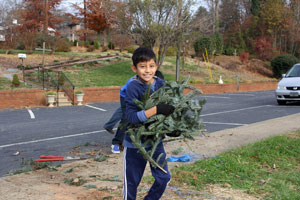
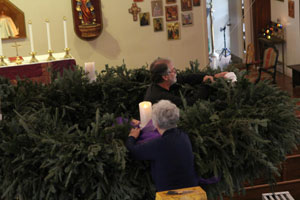
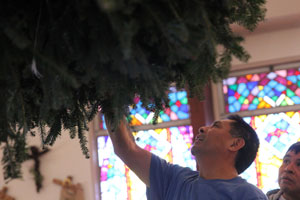 Pictured: Mario Diego and his family were among those who helped to make this year's Advent wreath at St. Charles Borromeo Church. As seen in the photos, parishioners help to carry the cut branches into the church and install the flameless candles and ribbon once the wreath has been constructed. (Photos by Patricia L. Guilfoyle and Margarita Francisco | Catholic News Herald)
Pictured: Mario Diego and his family were among those who helped to make this year's Advent wreath at St. Charles Borromeo Church. As seen in the photos, parishioners help to carry the cut branches into the church and install the flameless candles and ribbon once the wreath has been constructed. (Photos by Patricia L. Guilfoyle and Margarita Francisco | Catholic News Herald)
"Every year the Advent wreath is different. The frame is always the same frame, but it always takes on the character of the people that put it together," Deacon Martino notes.
And with its fragrant aroma and sturdy shape, the wreath offers a reflection on what it means to be a Christian, he adds. It inspires people to await the birth of Christ and of his coming again at the end of time with exuberant hope and joy, using all of their senses in worship.
This is the 31st year the parish has built these Advent and Christmas wreaths.
The idea was conceived by Father Ken Whittington not long after he came to the parish in 1992 and continued throughout the pandemic to Advent 2022.
"I was taken with this open space," he recalls. “It seemed perfectly suited for something immense.”
He mentioned the idea to parishioners Mike Koontz and George Waddell, who at first insisted that it couldn't be done. But the more Koontz and Waddell mulled it over, the more they thought it could indeed work.
They fashioned a frame using concentric rings of PVC pipe, then attached the frame to four heavy-gauge steel wires that suspend the wreath about 8 feet over the floor, midway down the interior of the church.
Flameless flickering candles replace real wax candles, for obvious reasons. Purple and rose ribbons finish off the simple design.
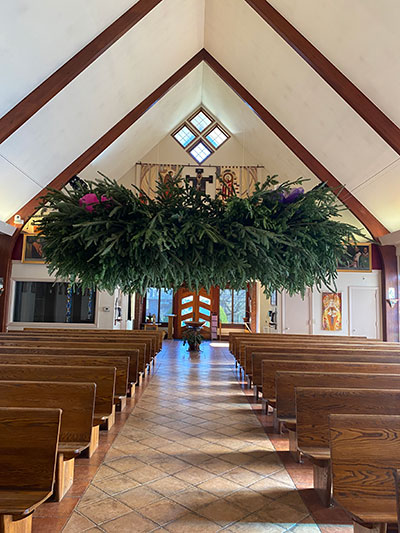 This year’s Advent wreath at St. Charles Borromeo Church in Morganton was assembled by parishioners using seven Christmas trees. It measures 11 feet in diameter. (Photo provided by Jenny Brown)Father Whittington says, "I must say that the first year here, it looked very large. People were afraid of it; nobody would sit under it because they thought it would fall! But over the years ... the wreath actually looks smaller – it doesn't look so intimidating, and people are finally able to sit under it and enjoy it.
This year’s Advent wreath at St. Charles Borromeo Church in Morganton was assembled by parishioners using seven Christmas trees. It measures 11 feet in diameter. (Photo provided by Jenny Brown)Father Whittington says, "I must say that the first year here, it looked very large. People were afraid of it; nobody would sit under it because they thought it would fall! But over the years ... the wreath actually looks smaller – it doesn't look so intimidating, and people are finally able to sit under it and enjoy it.
"In fact, it's sort of a mark of our Advent and Christmas season."
"It's something that's very important to us, something that's a part of who we are," adds Deacon Martino, both in terms of parishioners' sacramental life as well as their service to God and each other.
The wreath moves us all to prayerfully contemplate what church – and Christmas – are all about, he says.
On the first Sunday of Advent 2022, Deacon Martino delivered a homily that included the story of the wreaths and the significance of having members of the parish cut and assemble them.
“On this Advent Wreath, the branches represent the constancy and faithfulness of each person within our parish,” he said. “As evergreens flourish during every season, remaining unchanged through the messy days and harshness of winter, each of us is called to live our faith in this same way – with holy confidence and steadfast hope.”
— Patricia L. Guilfoyle. Annie Ferguson contributed.
‘A true mentor, true pastor and true priest’
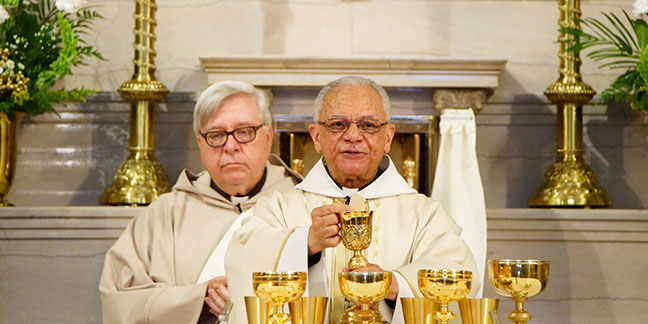 ASHEVILLE — Faithful from across the Diocese of Charlotte were saddened to hear of the Dec. 6 passing of Father Wilbur Thomas. Surrounded by family and friends, he passed at CarePartners Hospice Solace Center in Asheville. He was 75. Read his full obituary.
ASHEVILLE — Faithful from across the Diocese of Charlotte were saddened to hear of the Dec. 6 passing of Father Wilbur Thomas. Surrounded by family and friends, he passed at CarePartners Hospice Solace Center in Asheville. He was 75. Read his full obituary.
Cherished for his quiet wisdom, unwavering support, deep spirituality and angelic voice, Father Thomas’ friends flooded social media with messages of love and remembrance. They were also quick to reminiscence about their dear friend.
“My greatest memory of Father Thomas was on a trip to the Holy Land more than 30 years ago when we had Mass one early evening. If I remember correctly, it was getting dark. Mass was outdoors in Shepherds’ Field, and he sung the whole Mass. It’s never to be forgotten,” said Mercy Sister Susie Dandison. “He had a beautiful voice. During that trip, at one point, we also ended up on a stage dancing to a very famous piece of Israeli music. It was very lively, very well known. A bunch of us got on the stage. He was a beautiful person and a holy priest!”
Having served God and His people for 50 years as the Diocese of Charlotte’s first African American priest, the servant heart of Father Thomas was inextricably bound with the People of God in western North Carolina – and his passion for their spiritual welfare spanned five decades of ministry.
Wilbur Neely Thomas was born April 17, 1947, in Charlotte and adopted as an infant by Wilbur O. and Ruth N. Thomas of Lexington, N.C. The Thomases were Methodist, but after a stroke left his father bedridden when Wilbur was 10, the example of the local priest who came to visit inspired his parents to convert to Catholicism. When he was 12, Wilbur too decided to become Catholic.
Called to the Catholic faith and to priesthood
In 1960, Wilbur was baptized and confirmed at his local parish, Our Lady of the Rosary in Lexington, by Bishop Vincent S. Waters of the Diocese of Raleigh. His relationship with the Lord continued to deepen as he served at Mass and learned as much as he could about his newfound Catholic faith.
As a teenager, he felt the call to become a priest while praying before the Blessed Sacrament at his Catholic high school, Bishop McGuinness. At first his parents disapproved of their only son becoming a priest. They wanted grandchildren. However, by the time he was a senior in high school they agreed. Not long after he turned 18, he was accepted into the seminary program for the Diocese of Raleigh and began his studies at the Pontifical College Josephinum in Columbus, Ohio.
Father Thomas was ordained to the priesthood on March 26, 1973 – the Feast of the Annunciation – by Bishop Waters at Our Lady of the Annunciation Catholic Church in Havelock, N.C. At the time, he was among the first African American Catholic priests ordained in North Carolina, and shortly after his ordination, he transferred to the newly formed Diocese of Charlotte as its first black Catholic priest.
Throughout his life Father Thomas remained devoted to serving the Lord and His people, and his tireless work as a priest encompassed parish ministry, ministry to young people and college students, ecumenical outreach and dialogue, and leadership that inspired laypeople across the diocese to become more involved in the life of the Church.
A pioneer of many diocesan ministries
In many ways Father Thomas was a trailblazer – laying the foundations for many of the ministries and programs in which tens of thousands of Catholics in western North Carolina now participate.
Among his first achievements was building a ministry for young people. He was appointed the Charlotte diocese’s first Catholic Campus Minister, serving at Wake Forest University. He also helped develop the diocese’s Campus Ministry Program, Youth Ministry Program and Diocesan Youth Council, as well as serving as the first Youth Ministry director from 1976 to 1979.
“He was an amazing mentor when I was the first youth minister in the Diocese of Charlotte,” said Anne Trufant. “His love for the youth was such a gift, and when he sang, I’m sure it called down angels! Father Wilbur was a wonderful man of God. I am so grateful to have known him.”
In 1979, he helped organize the diocese’s second Diocesan Assembly on Evangelization, where he was its keynote speaker, and he helped coordinate planning assemblies that led up to the pivotal Diocese of Charlotte Synod in 1986-1987.
Father Thomas was also a leader for the early Catholic Charismatic Renewal Movement, which had a big impact on his spirituality according to friends. In 1974 he began a small prayer group in a parishioner’s home and, over the years, the group grew to more than 90 people meeting in the library at his alma mater, Bishop McGuinness High School.
As an African American priest, Father Thomas encouraged and inspired fellow black Catholics to get involved in the Church. He organized the diocese’s Committee of Black Catholic Ministry and Evangelization, now called the African American Affairs Ministry.
He also helped arrange the diocese’s first Dr. Martin Luther King Jr. Day celebration, with a Mass celebrated Jan. 25, 1986, at St. Patrick Cathedral in Charlotte.
Father Thomas served as master of ceremonies. Concelebrants were Bishop Michael Begley, bishop emeritus; Bishop John Donoghue, the newly ordained Bishop of Charlotte; and Bishop Joseph Lawson Howze of Biloxi, Miss., formerly a former priest of the Charlotte diocese and one of the first African American bishops in the United States.
Even after his retirement in 2018 from active ministry, Father Thomas continued to support and encourage the African American Affairs Ministry and its work.
“It has been a privilege and honor to have known Father Wilbur Thomas for over 27 years,” said Veronica Sartor, board member of the diocese’s African Affairs Ministry and parishioner of St. Lawrence Basilica in Asheville. “Not only was he a friend, but such a devout and caring priest. He provided encouragement, strength and compassion when I needed it. He directed and inspired me to become involved with the African American Affairs Ministry to enhance my knowledge about my Black Catholic heritage. Father Wil had such an angelic and beautiful voice that penetrated the walls of the basilica, especially when he sang a solo and parts of the Mass. Some parishioners call him ‘holy and Christ-like.’ I will really miss my friend and confidant.”
Devoted to his brother priests
Father Thomas was a pillar of fraternal support, encouragement and counsel for his fellow priests. He truly believed in the word “collegiality,” recall priests who knew him.
“I think the biggest joy he had was when he served as vicar for priests for our diocese,” said Father Morris Boyd, noting that Father Thomas also worked on continuing education for priests with the U.S. Conference of Catholic Bishops and chaired the diocese’s Presbyteral Council for many years. “He was always there.
He attended every ordination that he could possibly get to.”
This included Father Boyd’s ordination 44 years ago.
“Father Thomas and I go back a long way. He was present at my priestly ordination in 1978 and participated in the laying on of hands,” he said. “We worked together at the Basilica of St. Lawrence in Asheville from 2004 until we both retired in 2018. This gentle, quiet shepherd with the voice of an angel touched many lives – including mine. May the choirs of angels be forever jealous!”
Many priests turned to “Father Wil” for spiritual direction over the years.
“He was very kind, very considerate, and easy to talk to,” said Father Robert Ferris. “He was my spiritual director for a while, and I found him to be a man of great wisdom, well regarded by many people who had him as a pastor, and very devoted to his priesthood.”
Father Glen Dmytryszyn, a priest in the Archdiocese of Hartford, Conn., met Father Thomas when he was a high-school freshman. Originally from Connecticut, he and his family were parishioners at St. Lawrence Basilica at the time.
“Our faith had been re-sparked, and we started going to Mass. As I matured, I began to think about the priesthood. I met with Father Thomas when I was a junior.
He was the first priest I told had a priestly vocation,” Father Dmytryszyn recalled. “He was at my first Mass and blessed my paten and chalice. He was an amazing guy, and we never lost touch. I was still calling him to let him know what I’m doing, picking his brain for advice. He was a true mentor, true pastor and true priest. He really was intentional in his priesthood. It was so inspiring. I had so much respect for him.”
Connected to his family
Later in life after the deaths of his adoptive parents, Father Thomas was able to locate his biological family and developed a close relationship with his half-sisters, Elaine Lash Sutton and Dr. Adrienne Lash Jones, and their families. He enjoyed spending holidays and reunions with his newfound family. He learned that their shared biological father, Wiley Immanuel Lash of Salisbury, had been a successful businessman, the leader of local desegregation efforts, and the first African American man to serve as mayor of Salisbury. His mother, Marion Gunn, had been a brilliant college graduate who worked at Livingstone College as secretary to the president.
His half-sister Elaine remembers his ability to get along with all kinds of people. Now 84, she first met her brother “Father Wil” when she was in her 50s and – immediately recognized the resemblance with their shared father.
“Wil is a carbon copy of our dad. He looks just like my dad, and his mannerisms are just the same. Even though he was a private person, he knew how to make people comfortable around him,” she said. When they first met at a Thanksgiving dinner, she recalled, “It was like seeing someone I knew all my life, even though we just met. It was like we had always known each other.”
To Elaine, that first meeting was a confirmation of sorts. Growing up, she had always felt that she had a brother. When she was little – around the time Wil was born – she had a vivid dream: she envisioned a young man, dressed in red choir robes, singing in a church choir.
“I can still see that dream,” she says. Much later in life, she learned it was no dream: the boy she saw in her dream was her half-brother, Wil.
“When he came into our lives, we loved him so much.”
Elaine had grown up knowing Father Thomas’ mother, she said, and they had been good friends. “I loved his mother. But I never knew that she had a child until after she died.”
Elaine later learned that his mother had arranged the adoption in the hospital right after his birth, with Wil sent to live with a childless couple in Lexington.
After his adoptive parents died, Father Thomas sought out his birth family by tracking down the woman who had arranged the adoption.
His half-sister, family and friends were with Father Thomas at the time of his passing. Elaine recalls telling Father Thomas before she left his bedside that his deceased mother “is waiting for you with open arms. She loves you.”
To Elaine, getting to know her half-brother – albeit later in life – was a blessing, but she acknowledges that the Church really raised Father Thomas. “The Church was his family.”
A deeply spiritual man
Father Thomas’ family, friends and fellow priests all remember his calming and melodic voice, his wise counsel, the charity and love he shared with everyone he knew – and most importantly – his personal relationship with Jesus Christ.
His strong faith powered his lifelong efforts to help build up the Church in western North Carolina, and he encouraged everyone he encountered – whether it was young people, couples, families or his fellow priests – to always turn to God in prayer, keeping Him at the center of their lives and letting Him guide them.
Through all the joys and sorrows of his priestly vocation, Father Thomas’ relationship with Jesus sustained him. Upon his retirement in 2018, he told the Catholic News Herald that he cherished the time he spent praying before a crucifix and the Blessed Sacrament several times each day.
“That relationship has been the anchor for me,” he said. “Everything flows from that. I trust in His leading and guiding me through His Spirit. I trust myself to His will and His purpose for me every day.”
Reminiscences from people impacted by Father Thomas’ ministry
“Father Wilbur was a good man, gentle leader, and a listener with a heart of compassion. He was a pastor and shepherd to all. He believed that the people of God are Church. He recognized and encouraged lay leaders to be and to act as the Church. As pastor, he proclaimed the Good News of hope and love in a broken world.”
— Sister Peggy Verstege, Sister of Mercy
“When my dad was dying at Mercy Hospital, Father Thomas used to come visit. Daddy was not Catholic, but a devout Methodist. He loved it when Father Thomas came to visit. All religious barriers were crossed, and he brought much peace to my dad in his last days.”
— Sister Martha Hoyle, Sister of Mercy
“About two weeks before his passing, Father Wil and I talked about when he was a young priest stationed with Father William Wellein at St. Leo the Great (Parish) in Winston-Salem. Father Wellein had found out that The Platters musical group was going be in Hickory, and he arranged to take Father Wil to Hickory to that nightclub to hear The Platters. He had arranged to let the group know that this young priest had a beautiful voice and was going to be in the audience, and they called him on stage and Father Wil sang with The Platters, including a couple of songs by himself.”
— Father Morris Boyd
“Father Wilbur Thomas was a great and giving priest. He lived his priesthood so well in many different assignments, no matter what was asked of him. He served the people as a priest in all areas of the diocese and the various needs where he could help. Even in the past two years he gave witness to the good Lord in accepting the cancer. He was a good example for the priests in the diocese.”
— Father Edward Sheridan
“We remember every year celebrating New Year’s Day in our house for dinner with Father Thomas. We will miss our priest and friend forever. We love you. May he rest in peace.”
— Donna Muana
“God Bless Father Thomas, an excellent pastor to us, showing constant religious leadership. Our earthy loss is heaven’s gain.”
— Lawrence McCallen Brian Deas
“Father Thomas, thank you for all the advice. May the Virgin welcome you into her embrace. I’m saddened that you are no longer with us, but I will rejoice in knowing that you are in a better place, a place worthy of such a great human being and wonderful spiritual director.”
— Gerardo Martínez
“Father Thomas was a rock and has meant so much to so many peoples’ faith. I miss him. May all the peace of God now be with him eternally.”
— Karen Margaret O’Donnell
“Father Thomas was a seminarian along with Father Joe Vetter when I was in high school in Havelock. Our CYO group was in Jacksonville at Infant of Prague and I remember him singing – absolutely beautiful voice!”
— Linda Harris
“May the angels welcome him to paradise. He grew up in Lexington and went to my parish church. His mother was our organist. I always enjoyed seeing him in our diocese’s churches.”
— Suzanne DeRock Jones
“A great priest, musician – a holy man. May he rest in peace.”
— Deacon John Martino
“A truly wonderful priest! He was instrumental to my faith journey in coming to know the Lord, when I was just a teenager, and he was a young priest (St. Leo’s c. 1974).”
— Betti Pettinati-Longinotti
“He baptized my son. What a wonderful priest. May he rest in peace!”
— Christi Kreahling
“He celebrated his first nuptial Mass when he married Tom and me. May he rest in peace. A special, holy priest.”
— Pat Kane
“He was a living saint.”
— Herman Johnson
"Father Wilbur Thomas was a dear friend to me and many. He will be missed. Knowing he is no longer physically present creates a void in my heart but also a spirit of joy knowing he is now with the loving God he so generously brought to others. Father Thomas was very pastoral. He was gentle, kind, compassionate, and passionate about his call to the priesthood. He was a presence of Christ in life!"
— Sister Larretta Rivera-Williams, Sister of Mercy
Father Thomas’ assignment history in the Diocese of Charlotte:
2000-July thru 2018-July: Rector/Pastor at Basilica of St. Lawrence in Asheville
1999-January thru 1999-June: Parochial Administrator at St. Francis of Assisi in Jefferson
1998-July thru 2002-July: Vicar of Priests in Asheville
1987-July thru 1998-July: Pastor at St. Aloysius in Hickory
1979-July thru 1986-July: Pastor at Our Lady of Consolation in Charlotte
1977-August thru 1979-July: Pastor at Our Lady of the Annunciation in Albemarle
1975-June thru 1977-August: Assistant Pastor at St. Patrick Cathedral in Charlotte
1976-May thru 1979-July: Director at Diocesan Youth Ministry in Charlotte
1973-April thru 1975-June: Assistant Pastor at St. Leo the Great in Winston-Salem
1974-October thru 1975-October: Coordinator at Diocesan Campus Ministry in Winston-Salem














